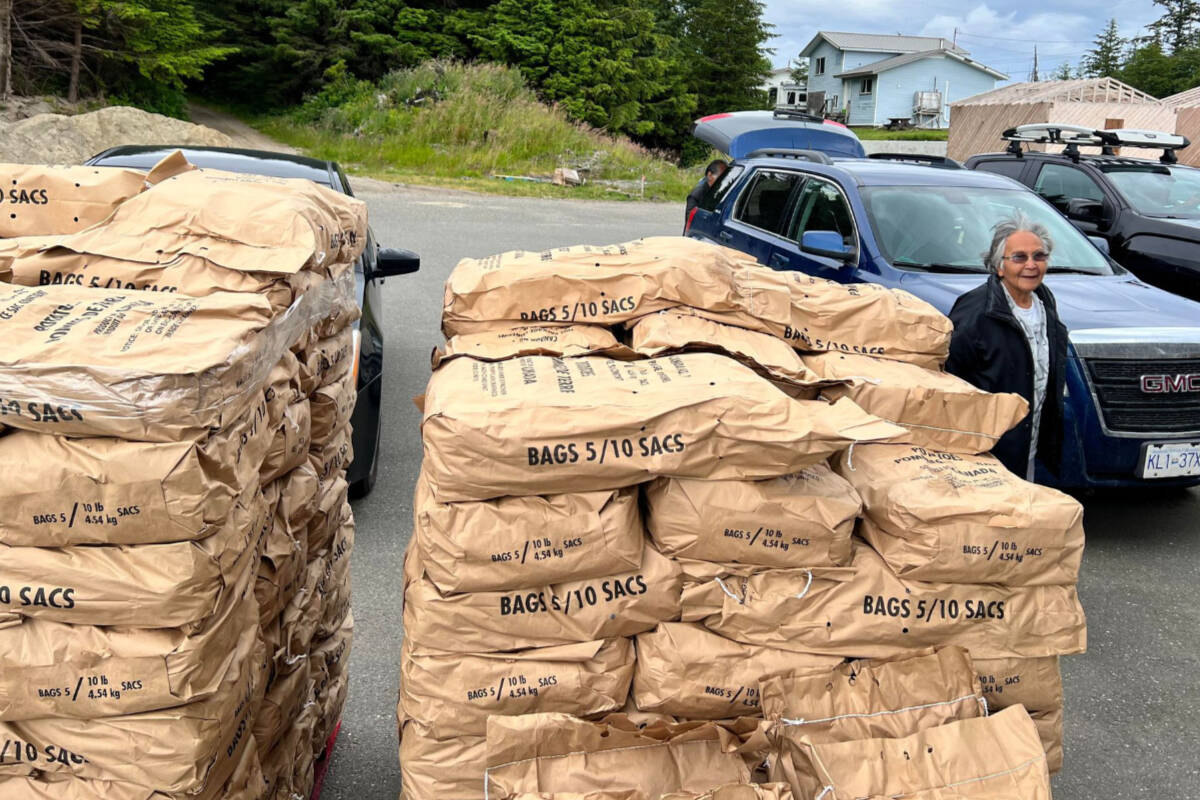A windfall from East Coast sent across the county to West Coast will see each Haida Gwaii household benefit, not from Yukon Gold, but from a 10-pound bag of PEI potatoes.
A Bandstra truck filled with 20,000 pounds of the tuber vegetable arrived in Old Massett on July 8.
Since then Christopher Horner, the elders’ centre coordinator at Old Massett Village Council (OMVC), has been contacting other villages so every household on Haida Gwaii gets a bag.
It started when Second Harvest, a non-profit focused on reducing food waste, called Shelley Crack, a community dietician and co-lead for Haida Gwaii’s Local Food to School program. The question posed to Crack and Horner was if they could manage a large shipment of root vegetables.
The response was, “Yes, please send them.”
The distribution of the bounty has required some coordination and teamwork. Village offices have been converted into temporary food pick-up hubs in Queen Charlotte and Masset. In Port Clements, OMVC student volunteers drove around leaving a bag of spuds on every doorstep.
“Tomorrow, July 13, they’re going out to Tow Hill Road and July 14 (Thursday) they’re driving down to meet the Sandspit ferry to send over 120 bags for them,” Horner said.
“So, it’s literally every house that has the opportunity.”
It’s not the first time food sharing has occurred.
Horner explained that last year OMVC shared halibut with every household on the island. They couldn’t do fish again so this year potatoes were the chosen food.
Before the COVID pandemic OMVC used to host meals that were open to anyone. The community meals had to be cancelled for the safety and protection of the Elders.
“It felt weird that we were turning people away for a while during COVID but then it feels good that we can give them a little gift and say you’re still part of our family,” Horner said.
The Haida Gwaii potato drop is one of more than 175 across the country organized by Second Harvest and Food Banks Canada, the national organization which represents food banks.
Terrace received 70,000 pounds of potatoes for dispersement. They handed out spuds to families in Terrace as well as sending pallets to neighbouring First Nations and rural communities including Stewart, along Highway 16 from Kitwanga to Prince Rupert, Kispiox, and the Nass Valley.
That millions of pounds of potatoes are being delivered across the country can be traced back to late last year with the discovery of potato wart in a few Prince Edward Island fields. The wart disfigures potatoes but poses no risk to human health.
Still, the federal government put a stop to moving potatoes off of Prince Edward Island in November 2021, to prevent the possibility of spreading the unsightly potato wart. The American government followed suit the same month by banning the import of potatoes from Prince Edward Island. That led to a concerted effort to both find a market for the potatoes before quantities went to waste and to financially assist potato farmers.
The result was the federal agricultural department providing payments to farmers and covering the transport of potatoes across the country as organized by Second Harvest and Food Banks Canada. In April, the American border opened up again to Prince Edward Island potatoes for consumption but not to seed potatoes grown in the island’s fields.
With files from Rod Link
READ MORE: Thousands of pounds of PEI potatoes arrive in Terrace
Kaitlyn Bailey | Local Journalism Initiative Reporter
Send Kaitlyn email
Send The Observer email
Like the Haida Gwaii Observer on Facebook
Follow us on Twitter

